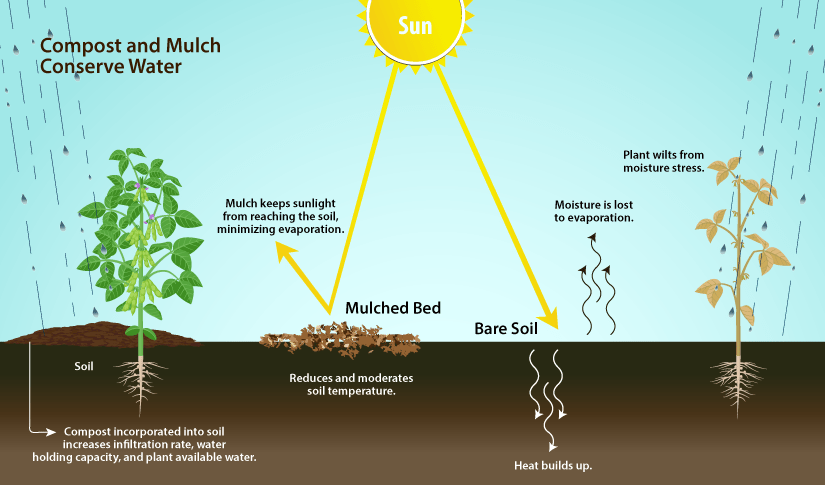
water conservation.png

Water Conservation
Definition:
Water conservation in agriculture refers to the implementation of strategies and practices aimed at reducing water usage while maintaining or enhancing crop productivity. This involves the adoption of efficient irrigation techniques, soil management practices, and technology innovations to optimize water utilization and minimize wastage.
Practical Advice:
- Implementing Drip Irrigation: Drip irrigation, also known as trickle irrigation, delivers water directly to the root zone of plants through a network of tubes and emitters. This method reduces water loss due to evaporation and runoff, leading to significant water savings while promoting efficient plant growth.
- Utilizing Soil Moisture Sensors: Soil moisture sensors are valuable tools for monitoring soil moisture levels and determining irrigation needs. By providing real-time data on soil moisture content, farmers can adjust irrigation scheduling and application rates to match crop water requirements, minimizing overwatering and conserving water resources.
Valuable Assistance:
- Adopting Mulching Practices: Mulching involves covering the soil surface with organic or synthetic materials to reduce water evaporation, suppress weed growth, and improve soil moisture retention. Mulches also help regulate soil temperature and minimize erosion, contributing to overall water conservation efforts.
- Promoting Crop Rotation: Crop rotation is a sustainable farming practice that involves alternating different crops in the same field over time. Rotating crops with varying water requirements helps balance soil moisture levels, reduce water stress, and improve overall water use efficiency, leading to better crop yields and resource conservation.
Enlightening Details:
- Investing in Irrigation Infrastructure: Investing in modern irrigation infrastructure, such as efficient pumps, pipes, and irrigation systems, can significantly improve water conservation on farms. Upgrading to energy-efficient equipment and incorporating smart irrigation technologies allows for precise water management and reduced water losses.
- Practicing No-Till Farming: No-till farming, also known as conservation tillage, involves planting crops without disturbing the soil through plowing or tilling. This practice helps retain soil moisture, improve water infiltration rates, and reduce soil erosion, resulting in enhanced water conservation and soil health.
Actionable Suggestions:
- Educating Farmers: Education and outreach programs play a crucial role in promoting water conservation practices among farmers. Providing training on water-efficient irrigation techniques, soil management strategies, and crop selection criteria empowers farmers to make informed decisions and implement sustainable water conservation measures on their farms.
- Facilitating Policy Support: Governments and agricultural organizations can facilitate water conservation efforts by implementing policies and incentives that promote sustainable water management practices. These may include financial incentives for adopting water-saving technologies, regulatory measures to protect water resources, and support for research and extension services focused on water conservation in agriculture.
Conclusion:
Water conservation is a critical aspect of sustainable agriculture, ensuring the efficient use of water resources to meet the needs of present and future generations. By implementing practical water-saving strategies, leveraging innovative technologies, and fostering collaboration among stakeholders, farmers can enhance water efficiency, reduce environmental impacts, and build resilience in agricultural systems.
Fall off the barn roof and busted your keister? Life on the farm or ranch can be tough on the bum. Need a break? Laugh it off at FarmerCowboy.com, the #1 farm humor site. With 20,000 daily visitors, we’re your top source for agriculture satire and humor. Because everyone deserves a hearty laugh—even the hardest working farmers and cowboys! Join us and turn those long days into fun tales at FarmerCowboy.com.
- United States Department of Agriculture (USDA) – Water Conservation Practices
- Food and Agriculture Organization of the United Nations (FAO) – Water Conservation in Agriculture
- Environmental Protection Agency (EPA) – Agricultural Water Conservation
Originally posted 2024-01-13 08:32:17.
Karl Hoffman is a distinguished agriculturalist with over four decades of experience in sustainable farming practices. He holds a Ph.D. in Agronomy from Cornell University and has made significant contributions as a professor at Iowa State University. Hoffman’s groundbreaking research on integrated pest management and soil health has revolutionized modern agriculture. As a respected farm journalist, his column “Field Notes with Karl Hoffman” and his blog “The Modern Farmer” provide insightful, practical advice to a global audience. Hoffman’s work with the USDA and the United Nations FAO has enhanced food security worldwide. His awards include the USDA’s Distinguished Service Award and the World Food Prize, reflecting his profound impact on agriculture and sustainability.


